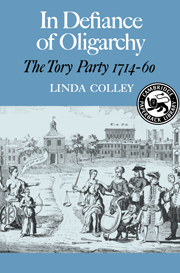Book contents
- Frontmatter
- Contents
- For my parents and Toby
- Preface
- Part I The Problem of Tory Survival
- Part II The Ingredients of Tory Survival
- 3 The Tory Party in Parliament
- 4 The Content of Toryism
- 5 The Tory Party in the Constituencies
- 6 The Fabric of the Tory Appeal
- Part III Single-Party Government Assailed
- Conclusion
- Appendix
- Manuscript Sources
- Notes
- Index
4 - The Content of Toryism
Published online by Cambridge University Press: 03 February 2010
- Frontmatter
- Contents
- For my parents and Toby
- Preface
- Part I The Problem of Tory Survival
- Part II The Ingredients of Tory Survival
- 3 The Tory Party in Parliament
- 4 The Content of Toryism
- 5 The Tory Party in the Constituencies
- 6 The Fabric of the Tory Appeal
- Part III Single-Party Government Assailed
- Conclusion
- Appendix
- Manuscript Sources
- Notes
- Index
Summary
In 1740 a whig lawyer, Henry Berkeley, jotted down some advice to an aspiring M.P. He could, thought Berkeley, ‘In conscience take up with any party at present, at least as I conceive, who imagine them not divided by the plain & easy understood principles of Whig & Tory, but by favour & dislike of Sir Robert's Ministry.’ He went on to add a qualification: ‘ I say in Conscience, because there are several other things that may draw you or me or any Man with the most upright heart into Party, as Education; Prejudice; the Persuasions of, or the desire of serving One's friends' I may add ambition.’ Many historians would agree with Berkeley in emptying Hanoverian toryism as well as Hanoverian whiggism of distinctive principle; those few who have acknowledged a continuing tory identity in this period have also tended to attribute it solely to culture and environment, though not of course to ambition. ‘Tories’, it is claimed, ‘were born, not made’; ‘post-1715 Toryism’ was ‘a tradition rather than a policy’; or again, ‘The Tory party…held no principles of government which conflicted with those of the victorious Whigs, its coherence was traditional.’
There is no doubt at all that heredity, friendship, and marriage patterns, as well as youthful indoctrination, did contribute to the party's survival. Of the 617 tory M.P.s who entered Parliament between 1715 and 1760 217 were the sons of tory M.P.s; 269 had gone to Oxford University as against only 76 to Cambridge; 120 were linked to other tory families by their own marriages.
- Type
- Chapter
- Information
- In Defiance of OligarchyThe Tory Party 1714-60, pp. 85 - 117Publisher: Cambridge University PressPrint publication year: 1982

